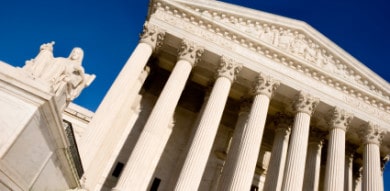 In 2008, Lane, a government employee was called to testify about acts of mail fraud and theft carried out by his fellow government employees. Lane alleged that he was then fired by the government agency for which he worked in retaliation for his truthful testimony.
In 2008, Lane, a government employee was called to testify about acts of mail fraud and theft carried out by his fellow government employees. Lane alleged that he was then fired by the government agency for which he worked in retaliation for his truthful testimony.
This week, after years of costly litigation, the Supreme Court unanimously held that Lane’s testimony was protected by the First Amendment, and thus the government official’s actions in firing him for said testimony raised serious constitutional concerns. Unfortunately, Lane will never see a dime in compensation for his losses because the Court also found that his claims were barred by qualified immunity.
Under the doctrine of qualified immunity public officials cannot be sued for their actions which violate the Constitution if, at the time the actions were taken, there was a good faith dispute as to whether such actions were constitutional. In other words, so long as an official can make a straight faced argument that it was not crystal clear that his actions were unconstitutional at the time he took them, he is wholly immune to suit. In the present case, the defendant argued that the law was unclear as to whether firing a public employee in retaliation for truthful testimony violated the First Amendment. Several circuit court decisions seemed to imply that such a firing would be unconstitutional, while a couple of other circuit decisions seemed to leave the door open. The fact that the law was not crystal clear is evidenced by the fact that it went to the Supreme Court.
And therein lies one of the major problems with qualified immunity. Nothing in constitutional litigation is ever crystal clear. The First Amendment states unequivocally that there shall be “no law” abridging the freedom of speech. Yet years of litigation have shown that prohibition to be an overstatement–the courts have regularly upheld laws and government actions restricting speech. In other words, the meaning of even the most clear cut constitutional prohibitions is always up for debate. As a result, public officials are virtually always immune from suit for violating individuals’ rights.
The practical effects of qualified immunity alone are bad enough that courts should rethink the doctrine, but this need is aggravated by the fact that qualified immunity is purely an invention of the court. That’s right, there is no law or constitutional provision expressly granting public officials immunity for violating individuals rights. The Court pulled it out of thin air in order to “facilitate decision making by public officials.”
Yet, here we are, years later, and it is settled law. Indeed the law is so settled that the Supreme Court was able to hold unanimously that even though Lane’s rights may have been violated, his suit was barred by the completely judge created doctrine. Only a lawyer wouldn’t find that a bit unnerving.
The team of California appellate attorneys at Kassouni Law focus on appeals regarding matters of property, government, and public policy. Should you wish to discuss your legal matter with the Sacramento and LA appellate lawyers at Kassouni Law, please call 877-770-7379 to set up an appointment, lead attorney Timothy Kassouni will speak with you personally.

